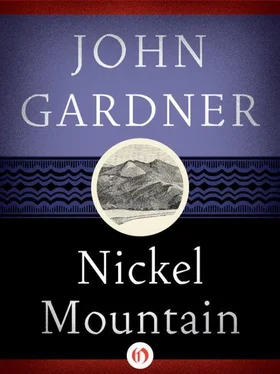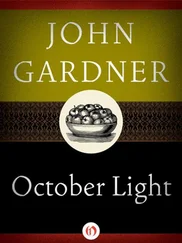Dear, Good Henry:
Forgive me for leaving you and causing you so much embarrassment and expense. Please ask all my friends and relatives to forgive me too. I hope I have not hurt anyone, and I know how disappointed. …
Dear Mr. Soames:
Miss Calliope Wells has asked me to tell you (since she is unwell. …
Because of the presents she couldn’t run away. And because Uncle Russel and Aunt Kate had come from Ohio, and Aunt Anna had altered the dress and was going to play the church organ, which she loved doing more than anything (and had once done beautifully, so people said), and Robert Wilkes had come all the way from the Eastman School of Music to sing “Because.” She slipped her hands up inside the veil and covered her face. In fifteen minutes Uncle John would be here.
She remembered sitting in the grass as a child, watching Uncle John at work. He was a carpenter, and the tools were like extensions of himself: He was one with the plane that glided down the pineboard, lifting a long, light curl of white; one with the quick, steady saw, the hammer that sent nails in cleanly at two blows, the wooden rule, the chalk, the brace and bit. When she tried, the nails would bend over cruelly, and Uncle John would smile. She’d fly into a temper, and he would laugh as though he and the old claw hammer knew a secret, and then he’d say kindly, “Be calm. Be patient.” She thought: Uncle John. He was old now, retired. His hands were twisted with arthritis. It was Uncle John who had brought her Prince when she was eleven. He was still just a puppy. He didn’t look at all like a police dog then. Furry as a bear that had not yet been licked.
She thought, fiercely, Of course I’m going to marry him. But Willard Freund was her own age, handsome and graceful: She saw him again in his white suitcoat at the senior dance, smiling at her with his head lowered a little, shy. Somewhere, surely, there was a man who was young and handsome and good as well, someone who would love her as completely as Henry did, and would make her heart race the way Willard did, by nothing but a smile. If she only waited. … The thought made her want to laugh bitterly, or, better yet, die. She would hate the child inside her. How could she help it?
But the maples on the lawn in front said, Be calm. In their heavy shade where the tables were, it would be cool. Always when there were family reunions, funerals, weddings, they would set up the tables there, as they had today, and cover them with bright colored cloths, and all the older women and some of the girls would work in the kitchen, and the men would play softball on the level space at the foot of the steeply sloping back yard, tromping down the clover, using burlap bags full of straw for bases. When Prince was young he would bark and chase them as they ran, or he’d steal the ball. (Uncle John had taught him to sit and stay.) Some of the women would play softball too, the girls and some of the younger wives. Uncle Grant was always the pitcher for both sides (smoking his pipe, wearing calf-manure-colored loafers and white slacks and a light blue cardigan sweater with leather buttons); Uncle Harris would be at third base, his suitcoat off, the striped suspenders tight-looking, and when nothing came his way he would stand there grinning, just like Bill, his jaw thrown forward as if crossly, stiff hair curling out from in front of his ears as her grandfather’s had done. Each time, some of the younger wives who’d played softball last time would not play this time but would sit on the porch with the older women, watching the children in the grass below and talking, laughing or complaining. When she’d hit her first homer, Uncle Grant had pretended to be indignant at her having connected with his pitch, and her handsome cousin Duncan had smiled as though he were proud that she was his cousin. Duncan was always the best of the players. If he missed a catch it was because he wanted to give you the run, or because one of the smaller children had grabbed hold of his legs. They made him bat one-handed, to be fair, but that was a joke; he would pop out a fly — so gentle that it seemed to float down to you on dove’s wings — to whichever of the younger kids hadn’t caught one yet, and if you missed the catch he would be out at the first base he came to that wasn’t being covered by a grown-up. They called him “the loser,” because every time he came to bat he would get himself put out, one way or another, and when he was at field he’d put nobody out except — he pretended — by accident. They razzed him and hooted at him and loved him: Useless as he was if you wanted to win, he was always the first one chosen. He was beautiful and good — he didn’t even smoke — and juggling three bats, gently and precisely popping up flies, standing on one hand, coins dropping from his trousers — and grinning, always grinning — he seemed to shine like an angel … or a bride. (When he’d brought the present by last night, he’d smiled again exactly as he’d smiled all those years ago when she’d hit that first homer, as though he was proud to be related to her. “Do I get to kiss the bride now?” he’d said, “—in case I come down with a cold sore?” She’d given him her cheek, blushing, and he’d kissed her lips and said, “Missed!” She’d pretended to slap him.) She thought of Henry Soames trying to play softball.
But, after all, her cousin Bill was no ballplayer, and she loved him as much as Duncan. They would sit in the room that had once been her grandfather’s study — this up at Pear Hill, the old family place — playing chess. He’d sit with his horn-rimmed glasses in one hand and would talk about books she would really like, he was sure. (She would promise herself faithfully to get them from the city library in Slater, but always she would forget the titles.) Bill was going to be a lawyer and maybe go into politics, like Uncle Earle. He was only twenty-two, but already he was a member of the steering committee for some organization that had something to do with Indians. He and Duncan were like brothers, and always it had been sad to her that she was younger. Even grown up they were as splendid as ever, “professionals,” her father said — the two prides of the family. (Her father, the family failure, in a way — he’d left off farming to work in a factory — was even prouder of Duncan and Bill than the rest of the family.) Bill had given her a subscription to the Columbia Record Club. When Cousin Mary Lou had said, “Who’s the cheap one?” fingering it, Callie had bristled with anger. Bill gave away money to every charity there was and probably some that had gone out of business fifty years ago, and one time he’d given Callie a book worth fourteen dollars, pictures of famous places. He gave presents because they seemed to him right, just like Uncle Earle. He would have given her the same present whether it cost him fifteen cents or a thousand dollars, practically. “That just shows how little you know,” Callie had snapped. Cousin Mary Lou had been hurt. And immediately Callie had seen that Mary Lou was right, everyone who didn’t know him well would think the same thing Mary Lou had thought: so that even the wedding presents weren’t hers, it turned out, but everybody else’s; she decided to put his present out of sight.
“You don’t really like me,” Mary Lou said, tears in her eyes.
“Don’t be stupid,” Callie said. “If I didn’t like you would I choose you for maid of honor?”
“Your mother made you do it,” she said. One of the tears rolled down her fat cheek toward the fold between her chins.
“Oh, really, Mary Lou!” She took her hand, feeling guilty (it was true, Mary Lou had been her mother’s idea), and she said, “Mary Lou, I feel closer to you than to anybody else in the world.” She was amazed, hearing herself say it; but Mary Lou believed it. If she didn’t like Mary Lou, she ought to. Mary Lou had hardly eaten a bite since the morning Callie had asked her to be maid of honor, dieting ferociously to look pretty for it. She hadn’t lost weight; she’d gotten circles under her eyes.
Читать дальше











